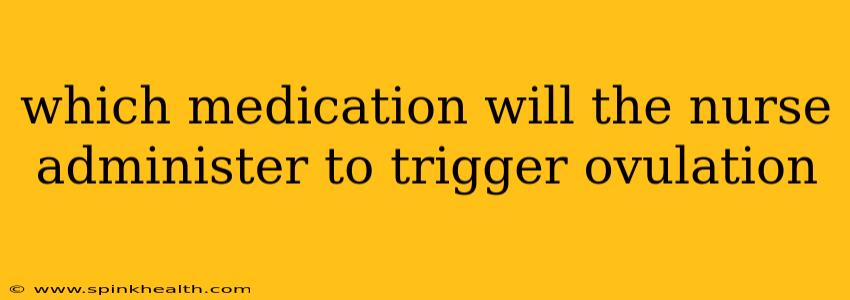Which Medication Will the Nurse Administer to Trigger Ovulation?
The journey to conception can be a winding road, and for some, medical assistance is needed to navigate the path to pregnancy. One crucial step in fertility treatments is triggering ovulation – the release of a mature egg from the ovary. But the specific medication a nurse administers depends heavily on the individual's medical history, the reason for infertility, and the overall fertility treatment plan. It's not a one-size-fits-all scenario. Think of it like this: a skilled chef wouldn't use the same recipe for every dish, and a fertility nurse certainly wouldn't use the same medication for every patient.
Let's delve into some of the common medications used to trigger ovulation and the nuances surrounding their use.
What are the common medications used to induce ovulation?
Several medications can stimulate the ovaries to release an egg, each with its own mechanism of action and potential side effects. The most frequently used include:
-
Clomiphene Citrate (Clomid): This oral medication is often the first-line treatment for ovulation induction. It works by blocking estrogen receptors in the hypothalamus, tricking the brain into thinking estrogen levels are low. This, in turn, signals the pituitary gland to release more follicle-stimulating hormone (FSH) and luteinizing hormone (LH), stimulating follicle growth and ultimately ovulation. Imagine it as a gentle nudge to the system. While generally well-tolerated, some women experience side effects like hot flashes, headaches, and mood swings.
-
Letrozole: Another oral medication, Letrozole, works differently. It's an aromatase inhibitor, meaning it prevents the conversion of androgens (male hormones) to estrogen. This lowered estrogen level again signals the brain to increase FSH and LH production, leading to ovulation. Often considered a good alternative to Clomid, it may be preferred by some due to a potentially lower risk of multiple pregnancies (though this is still a possibility with both medications).
-
Gonadotropins (e.g., Follistim, Gonal-f, Menopur): These injectable medications directly stimulate the ovaries. They contain FSH and/or LH, mimicking the body's natural hormones. These are typically reserved for women who haven't responded well to Clomiphene Citrate or Letrozole, or those with specific conditions like low ovarian reserve. Because they are more potent, they are closely monitored via blood tests and ultrasounds to prevent ovarian hyperstimulation syndrome (OHSS), a serious complication.
What are the risks and side effects of ovulation-inducing medications?
While these medications significantly help many women conceive, they are not without potential risks. The most common side effects include:
- Ovarian Hyperstimulation Syndrome (OHSS): A serious complication characterized by enlarged and painful ovaries, fluid buildup in the abdomen, and potential organ damage. The risk is higher with gonadotropins.
- Multiple Pregnancies: The increased chance of releasing multiple eggs leads to a higher risk of twins, triplets, or more.
- Ectopic Pregnancy: A pregnancy outside the uterus, often in the fallopian tube.
- Miscarriage: While not directly caused by the medication, there's a slightly higher risk of miscarriage in women undergoing fertility treatments.
These risks are carefully weighed against the potential benefits by the fertility specialist, and close monitoring is essential.
How is the "right" medication chosen for a patient?
The selection of medication for ovulation induction is a highly personalized process. The fertility specialist considers several factors:
- Age: Older women may require more aggressive stimulation.
- Ovarian Reserve: The number of eggs remaining in the ovaries.
- Medical History: Any underlying health conditions.
- Previous Fertility Treatments: Response to prior medications.
- Specific Infertility Diagnosis: The cause of infertility guides the treatment plan.
The nurse's role is crucial in administering the prescribed medication, monitoring the patient's response, educating the patient about potential side effects, and communicating with the fertility specialist. They are vital members of the fertility care team.
What if ovulation-inducing medications don't work?
If ovulation-inducing medications are unsuccessful after several cycles, the fertility specialist may recommend other treatment options such as intrauterine insemination (IUI) or in vitro fertilization (IVF). Each step of the process is carefully considered, aiming for the best outcome for the individual patient.
This information is for educational purposes only and does not constitute medical advice. Always consult with a healthcare professional for any questions regarding your health or treatment options.

